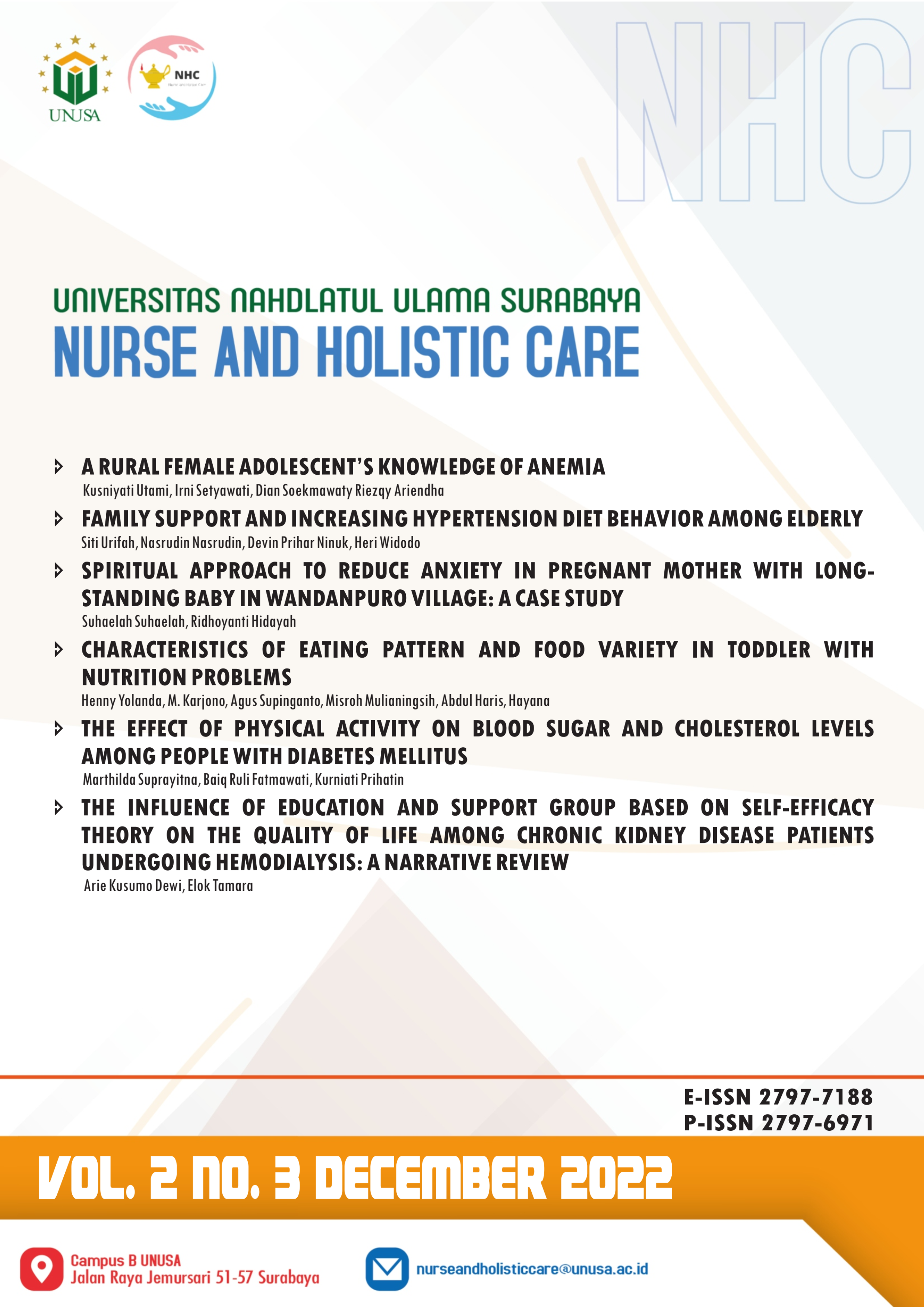THE INFLUENCE OF EDUCATION AND SUPPORT GROUP BASED ON SELF-EFFICACY THEORY ON THE QUALITY OF LIFE AMONG CHRONIC KIDNEY DISEASE PATIENTS UNDERGOING HEMODIALYSIS: A NARRATIVE REVIEW
##plugins.themes.bootstrap3.article.main##
Abstract
Background: Support group is a therapeutic process in a group that has the same problems to condition and provide reinforcement to the group or individual in the group according to the problem so as to achieve effective coping skills against the problem or trauma experienced and improve the patient’s quality of life.
Objective: This review was to summarize and identify the current literature related to the influence of education and support group based on self-efficacy theory on the quality of life among chronic kidney disease patients undergoing hemodialysis.
Methods: Data sources included two electronics databases: Google Scholar and Elsevier to search literature published between 2015 and 2022. A narrative review process was extract and analyze the data of all included studies.
Result: The search found three articles that met the inclusion and exclusion criteria, including articles published in 2015 until 2022 and full-text form. Articles that meet the criteria are then analyzed narratively. Data search using keywords and criteria in the electronic data based above, resulted in 3 articles. From these articles, the interventions carried out, namely the Education, Support Group, Hemodialysis, Chronic Kidney Disease.
Conclusion: The support group program has proven to be effective in increasing the patient’s ability to manage his condition and improve the quality of life.
Downloads
##plugins.themes.bootstrap3.article.details##
Copyright (c) 2022 Arie Kusumo Dewi, Elok Tamara

This work is licensed under a Creative Commons Attribution-NonCommercial 4.0 International License.
Authors who publish with Nurse and Holistic Care agree to the following terms:
- Authors retain copyright licensed under a Creative Commons Attribution-NonCommercial 4.0 (CC BY-NC 4.0), which allows others to remix, tweak, and build upon the authors' work non-commercially, and although the others' new works must also acknowledge the authors and be non-commercial, they don't have to license their derivative works on the same terms.
- Authors are permitted and encouraged to post their work online (e.g., in institutional repositories or on their website) prior to and during the submission process, as it can lead to productive exchanges, as well as earlier and greater citation of published work (See The Effect of Open Access). Authors can archive pre-print and post-print or publisher's version/PDF.
References
Astuti, Anggorowati, Kusuma (2017) Self management of psychosocial adjustment of chronic kidney disease patients with hemodialysis, Soedirman Journal of Nursing, Volume 12, No.3 November 2017. DOI: https://doi.org/10.33546/bnj.88
Nopsopon, T., Kantagowit, P., Chumsri, C., Towannang, P., Wechpradit, A., Aiyasanon, N., Phaichan, R., Kanjanabuch, T., & Pongpirul, K. (2022). Nurse-based educational interventions in patients with peritoneal dialysis: A systematic review and meta-analysis. International Journal of Nursing Studies Advances , 4 . https://doi.org/10.1016/j.ijnsa.2022.100102. DOI: https://doi.org/10.1016/j.ijnsa.2022.100102
Relawati, A., Hakimi, M., Huriah, T., Studies, P., Nursing, M., University, P., & Yogyakarta, M. (2015). The Effect of Self Help Group on the Quality of Life of Hemodialysis Patients at the Yogyakarta Muhammadiyah Public Health Center Hospital. In Scientific Journal of Health Nursing (Vol. 11, Issue 3). DOI: https://doi.org/10.26753/jikk.v11i3.112

